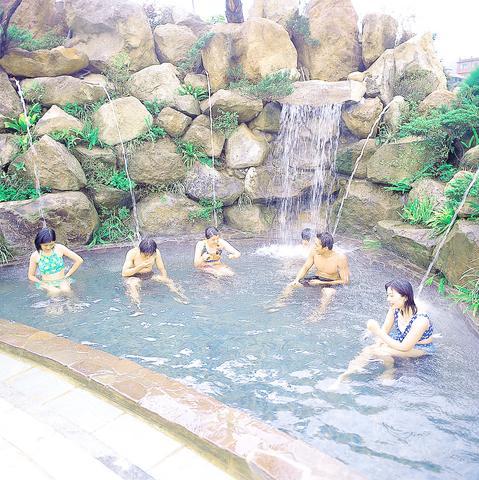As SARS continues to upset the routines of everyday life and people stay at home rather than risk going out, many businesses are suffering from the effects of the pernicious disease.
Dimmed by the market slowdown, a number of local companies are now coming up with all kinds of bright ideas in the hope of offsetting their losses.

PHOTO COURTESY OF TIEN LAI SPRING RESORT
The familiar practice of low pricing has been effective in bringing back some customers, but hot spring resorts have gone a step further with their claims that a soak in a hot spring pool is so good for you it can boost the immune system and help defend the body against SARS.

PHOTO COURTESY OF TIEN LAI SPRING RESORT
Lucy Lee (
A different tack has been taken by two resorts on Yangmingshan, at Peitou (北投) and Kinshan (金山). They are trying to attract the general public by promoting the idea that one of the most effective ways of beating SARS is to take a healthy hot spring, away from the disease's hot spots in the city and enjoy gourmet food at a scenic hideaway.
As a result of these promotional efforts, or perhaps because they are ready to get back to normal life, people in Taipei have responded to the calls of the hot spring owners, as the large number of visitors to resort hotels on Yangminshan last weekend showed.
The hot springs in these areas mostly originate from the Tatun mountain range (
Bathing in hot springs is a favorite leisure activity of many Taiwanese that was picked up from the Japanese during the 50-year colonial-rule period beginning in 1895. In Japan the merits of taking a daily dip in the hot spring have been preached like a gospel since the eighth century.
The story goes that Taiwan first acquired the habit when a Japanese businessman from Osaka, named Hirada Gengo (
In addition to Peitou and Yangmingshan, Guanziling (
The hot spring waters in Peitou belong to the acid sulfur type, which are quite different from the nearby springs in Yangmingshan, which contain a weak alkali type of water. In Guanziling, however, the spring water carries alkali and salt, whereas in Sichongxi the water is distinguished by its weak alkali and carbonic acid content.
Hot spring resorts have also developed in Wulai (
All hot spring resorts claim their spring waters have extraordinary healing effects, such as improving skin tone, increasing circulation and digestion, as well as other functions of the body. Also, many scientists have confirmed the beneficial effects of bathing in hot springs.
One thing is certain, however, and that is, when a person relaxes in a hot spring pool, natural or suffused with fragrance, the comfort naturally brings forth a refreshing effect, spiritual and physical, against which little else can compete.

Towering high above Taiwan’s capital city at 508 meters, Taipei 101 dominates the skyline. The earthquake-proof skyscraper of steel and glass has captured the imagination of professional rock climber Alex Honnold for more than a decade. Tomorrow morning, he will climb it in his signature free solo style — without ropes or protective equipment. And Netflix will broadcast it — live. The event’s announcement has drawn both excitement and trepidation, as well as some concerns over the ethical implications of attempting such a high-risk endeavor on live broadcast. Many have questioned Honnold’s desire to continues his free-solo climbs now that he’s a

As Taiwan’s second most populous city, Taichung looms large in the electoral map. Taiwanese political commentators describe it — along with neighboring Changhua County — as Taiwan’s “swing states” (搖擺州), which is a curious direct borrowing from American election terminology. In the early post-Martial Law era, Taichung was referred to as a “desert of democracy” because while the Democratic Progressive Party (DPP) was winning elections in the north and south, Taichung remained staunchly loyal to the Chinese Nationalist Party (KMT). That changed over time, but in both Changhua and Taichung, the DPP still suffers from a “one-term curse,” with the

Jan. 26 to Feb. 1 Nearly 90 years after it was last recorded, the Basay language was taught in a classroom for the first time in September last year. Over the following three months, students learned its sounds along with the customs and folktales of the Ketagalan people, who once spoke it across northern Taiwan. Although each Ketagalan settlement had its own language, Basay functioned as a common trade language. By the late 19th century, it had largely fallen out of daily use as speakers shifted to Hoklo (commonly known as Taiwanese), surviving only in fragments remembered by the elderly. In

Lines between cop and criminal get murky in Joe Carnahan’s The Rip, a crime thriller set across one foggy Miami night, starring Matt Damon and Ben Affleck. Damon and Affleck, of course, are so closely associated with Boston — most recently they produced the 2024 heist movie The Instigators there — that a detour to South Florida puts them, a little awkwardly, in an entirely different movie landscape. This is Miami Vice territory or Elmore Leonard Land, not Southie or The Town. In The Rip, they play Miami narcotics officers who come upon a cartel stash house that Lt. Dane Dumars (Damon)